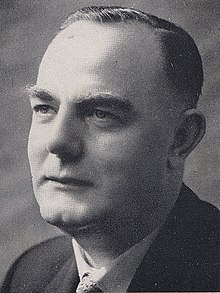Our website is made possible by displaying online advertisements to our visitors.
Please consider supporting us by disabling your ad blocker.
John Vorster
B. J. Vorster | |
|---|---|
 Vorster in 1960 | |
| 4th State President of South Africa | |
| In office 10 October 1978 – 4 June 1979 | |
| Prime Minister | Pieter Willem Botha |
| Preceded by |
|
| Succeeded by | Marais Viljoen |
| 7th Prime Minister of South Africa | |
| In office 13 September 1966 – 2 October 1978 | |
| President |
|
| Preceded by |
|
| Succeeded by | Pieter Willem Botha |
| Minister of Police | |
| In office 1 April 1966 – 9 August 1968 | |
| Prime Minister |
|
| Preceded by | Office established Himself (as Minister of Justice) |
| Succeeded by | Lourens Muller |
| Minister of Justice | |
| In office 8 October 1961 – 14 September 1966 | |
| Prime Minister | Hendrik Verwoerd |
| Preceded by | Frans Erasmus |
| Succeeded by | Petrus Cornelius Pelser |
| Personal details | |
| Born | Balthazar Johannes Vorster 13 December 1915 Jamestown, Cape Province, Union of South Africa |
| Died | 10 September 1983 (aged 67) Cape Town, Cape Province, South Africa |
| Political party | National Party |
| Spouse | |
| Children | Elizabeth (Elsa) Vorster Willem Carel Vorster Pieter Andries Vorster |
| Alma mater | University of Stellenbosch |
| Part of a series on |
| Apartheid |
|---|
 |
Balthazar Johannes "B. J." Vorster (Afrikaans pronunciation: [ˈbaltɑːzar juəˈhanəs ˈfɔrstər]; 13 December 1915 – 10 September 1983), better known as John Vorster, was a South African politician who served as the prime minister of South Africa from 1966 to 1978 and the fourth state president of South Africa from 1978 to 1979. Known as B. J. Vorster during much of his career, he came to prefer the anglicized name John in the 1970s.[1]
Vorster strongly adhered to his country's policy of apartheid, overseeing (as Minister of Justice) the Rivonia Trial, in which Nelson Mandela was sentenced to life imprisonment for sabotage, (as Prime Minister) the Terrorism Act, the complete abolition of non-white political representation, the Soweto Riots and the Steve Biko crisis. He conducted a more pragmatic foreign policy than his predecessors, in an effort to improve relations between the white minority government and South Africa's neighbours, particularly after the break-up of the Portuguese colonial empire. Shortly after the 1978 Internal Settlement in Rhodesia, in which he was instrumental, he was implicated in the Muldergate Scandal. He resigned the premiership in favour of the ceremonial state presidency, from which he was forced out as well eight months later.
- ^ Hawthorne, Peter (4 October 1976). "'A Cool Man on a Lion Hunt,' South Africa's John Vorster Tries to Head Off a Race War". People. Retrieved 28 May 2018.
Previous Page Next Page


